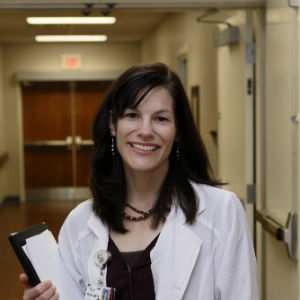
Mary Beth Landes, MS, RD, CSO, is the dietitian who works full-time at Augusta Health’s Center for Cancer and Blood Disorders, working with patients daily to treat cancer and prevent its recurrence. “Non-starchy vegetables are full of naturally-occurring phytochemicals, and those are beneficial for cancer prevention,” she says. “Each phytochemical has a different function—some decrease the risk of cancer occurring or developing and other decrease the risk of cancer spreading. So it’s important to eat a variety of these vegetables for maximum protection. The more colors, the better. I like to advise people to ‘eat the rainbow’.”
That’s because the vegetables—fresh or frozen, not processed—that contain the beneficial phytochemicals tend to be those with deep, vibrant colors:
- Carotenoids are red, orange and green fruits and vegetables that may inhibit cancer cell growth, work as antioxidants and improve immune response. Examples are broccoli, carrots, apricots, spinach, collard green, turnip greens, cantaloupe and cooked tomatoes.
- Terpenes may protect cells from becoming cancerous, slow cancer cell growth, strengthen immune function and limit production of cancer-related hormones. Examples are cherries, citrus fruit peel and rosemary.
- Flavonoids may inhibit inflammation and tumor growth, may aid immunity and boost production of detoxifying enzymes in the body. Examples are applies, citrus fruits, onions, soy products and coffee (yes!) and tea.
“Fiber is also important to consume as part of a healthy diet to decrease the risk of developing cancers of the colon and rectum,” adds Landes. Good sources of fiber are oat, barley, quinoa and even plain popcorn, as well as fresh fruits and vegetables, beans, legumes and nuts. “With this starch group, I encourage eating whole grains. You need all three layers of the grain, including the outer bran and germ layers in order to get the protein, Vitamin E, and antioxidant benefits of disease prevention. Processed grain is just carbohydrate without the benefits.”
Landes does not believe that people must become vegetarians to prevent cancer, though. Although processed meats—especially those with nitrates and nitrates that are known to cause cancer—and meats cooked quickly at high temperatures or charred—should be avoided, meat and proteins are part of a well-balanced diet. Landes recommends choosing poultry or fish that are baked, broiled or grilled without the breading or the skin. “Fatty fish (such as salmon, wild mackerel or tuna) offer the added heart health benefit of omega-3 fatty acids. Red meat should be limited, with the best option being to purchase grass-fed beef if possible. Kabobs, omelets, smoothies and stir fry are ways to combine protein sources and vegetables to be tasty for all—even those who say they don’t like vegetables,” she says.
And a diet does not have to be trendy to provide the benefits of cancer prevention.
“As a dietitian, people often ask me what diet I follow. Is it Paleo? Whole 30? Vegetarian or Vegan? But I tell them, honestly, what I really follow is a simple and basic approach called the ‘Plate Method’,” says Landes. To follow the plate method, fill half your plate with non-starchy vegetables—like those with phytochemicals, a quarter of the plate with protein (chicken, fish, beef, pork, eggs, beans, tofu or nuts) and a quarter with starch (peas, winter squash, sweet potatoes or whole grains). Fruit and dairy are used as side dishes. Again, Landes advises to add variety, use whole grains, and be mindful with using appropriate portion sizes and protein selections.
“More than six, three-ounce servings per week of red meat have been shown to increase the risk of colon cancer,” she adds. “I also advise people to limit salt. Heavy use of salt increases the risk of stomach cancer. Variety and moderation are both important.”
Newer research indicates that some cancers are linked to obesity. “Normal cells will die under certain conditions, such as when a cell’s DNA is damaged beyond repair,” explains Landes. “Research now shows that as weight increases to levels that are overweight or obese, that mechanism becomes flawed and the cancer cells survive. So just keeping our weight at recommended levels can itself help reduce the risk of cancer.”
To keep weight at recommended levels, Landes recommends adding physical activity to a healthy diet. “It’s may be difficult to start ‘exercising’, especially if it’s not something you’re used to doing. So start slow—go for a walk. Then each week, try to walk more often or a little bit longer than you did the week before. You’ll walk your way into exercise.”
So…can broccoli prevent cancer? Not completely. “Genetics and environmental factors still impact the development of cancer,” says Landes, “but research shows that diet and physical activity can prevent or reduce the risk of one-third of cancers. All things considered, those are pretty good odds.
Article by Lisa Schwenk










